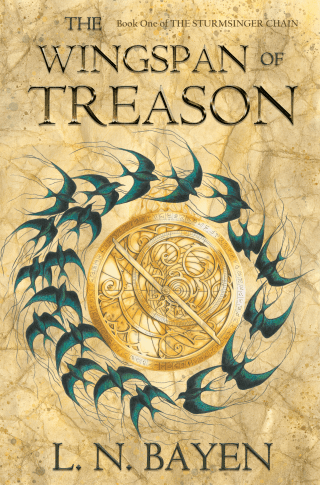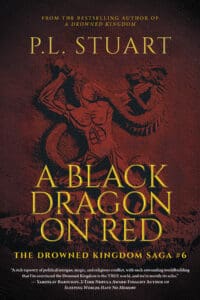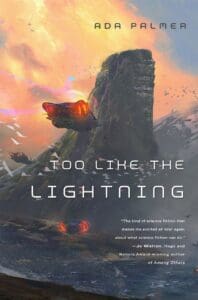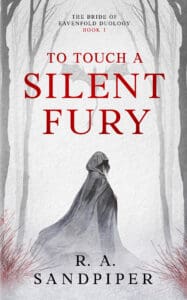
Synopsis:
Invelmar. A great kingdom boasting unrivalled peace and a brutal grip over the known world. A kingdom built with blood.
Former Invelmari prince Klaus surrendered everything to it. Now he’s fleeing a shattering betrayal and wondering why his parents want to kill him.
Neighbouring Derinda – a once-magnificent realm devastated by Invelmar’s damming of its mighty river – may offer Klaus a new life mapping distant roads. But feuding Derinda makes poor refuge for a fugitive mapmaker, and there’s no peace from his questions here. Questions about who his real family are. Questions about the sentient particles awakening in Derinda’s desert, intent on unearthing the devastating secret buried in its sands…
Because this desert wind is thick with poets and pirates, shamans and spaewives, and the answers are far worse than Klaus could have imagined. His loyalties to his beloved home are fast unravelling, and the desert clamours for a trial of Invelmar’s crimes. But can he separate vengeance from justice?
Does he even want to?
TRUTH IS A KNIFE. LOYALTY’S A CAGE. NO ONE IS INNOCENT.
Review:
The Wingspan of Treason is a whirlwind tome of deceit, mystery, and mapmaking, drawn (see what I did there?) with an expert hand by one L.N. Bayen. This book is rich, dense, and full of lore. One that takes you on a journey of self-discovery, as well as devastating brutality.
Where to even start describing this chonk? I suppose you can boil this thick tale down into betrayals of blood (or lack-thereof…perhaps). Klaus, a prince that was supposed to be the heir to a throne, flees his homeland because of a murder plot against him, involving his ruling parents (more on that below). With him comes his two bestest buds, Verdi and Arik. They flee to Verdi’s people/clansmen in a neighboring desert, and what unfolds is a two-pronged (in my view) arc of royal blood causing a lot of strife. Plus there are some birds (as well as other fun animal familiars). Some treason. Lots of maps. Some mysterious instruments, aka McGuffins. Did I mention treason?
The cast of TWoT starts small with the three lads but quickly expands into a sprawling epic. There are so many POVs, I lost count. And yet, none of this bogs down the narrative, each are strong characters to follow, all with goals and motivations. So many characters juggled by Bayen, not one feels lesser than. It’s quite amazing how each character feels real, feels part of the story and not just there for plot reasons.
But let’s stick with the mains, and for me, that’s Klaus and Verdi. Klaus is the main character for all intents and purposes, 1A, if you will. Klaus is a chronicler (again, more on that below) and interested in mapmaking. He’s an adoptive son by the throne and designated heir, but plots/schemes abound and he flees before he can be killed. His humble desire to be smart is offset by his training, and those said smarts play major fun roles in the story. The growth of Klaus across these pages is just a joy to witness. All the way to the final revelations to why he was hunted, he’s just awesome. And while this story starts off with Klaus’ flight, Verdi’s arc quickly becomes the main driving force of the story in my opinion. The 1B, sometimes 1A protag. Verdi’s also got some royal-esque blood (world lore specific), so when the lads get to his people, more than half the story shifts to what’s going on in that land (spoiler, it’s a lot!). I really liked Verdi because he is the truest ‘reluctant chosen one’ trope (some might say naive, which I will!). His character is just one of those you cannot help but want to root for. I just loved Verdi. He also has a little fuzzy familiar called Ravi, a cute little creature.
While the characters rightly are front and center, this book is filled with lush worldbuilding. The lore is so meticulous, you can tell Bayen spent so much time crafting each individual location, each history, each everything. It truly shows how deep this world is. I really enjoyed the fact this world is based on maps/locations. There was an event that shaped the current iteration of the world and it was called The Second Redrawing, by a dude named Sturmsinger (series title drop!). I think this concept is super neat and quite original.
There is really little to no magic in this world but one of the bits I really enjoyed are the four Forms. These Forms are: Warrior, Blacksmith, Jurist, and Intelligencer. Basically these are strict training regimens that are trusted by the people in this world to be experts at what they do. Klaus is trained as an Intelligencer, someone who can put all emotion aside and use logic and knowledge to look at situations. They are also historians (chroniclers and mapmakers) so Klaus’ training really plays a major role in the story for many different reasons, also to his detriment at times, specifically the ending revelation. Arik is trained as a Warrior, so his arc has a lot to do with protecting Klaus/Verdi but also factors into the pirate subplot. I really liked how the focus of these Forms was nothing to do with magic but more with training, it reminds me a lot of higher education careers, like surgeons, you know, what Bayen is in real life…but yeah, the Forms concept was really neato.
I also enjoyed the various instruments or McGuffins dropped in along the way. We have sundials, moondials, compasses, mysterious ore, sundisks. These are but a few objects that factor into the expansive worldbuilding. I joke when I say McGuffins because sometimes they feel like that but really they are important pillars of Klaus’/Verdi’s arcs.
The prose is phenomenal. Seriously some of the best writing I’ve seen in an indie book. It’s beautiful, it’s complex, it paints the scene with a visceral brush. The pace is on the slower side, so anyone expecting a quick read, that’s not this story. Since the world lore is so rich, we spend a lot of time exploring it. It’s a journey book, both literally with Klaus/Verdi, but also historically. Knowledge comes at a steady pace and each builds and builds upon the last. It’s a conversation book, if such thing exists. A lot of the worldbuilding comes via dialogue, but none of it is stilted, it flows naturally. Questions where appropriate, long-winded dumps when necessary, none of it forced. There is action/battles, so it’s not all dialogue and history lessons. A huge battle near the climax that was really well-executed. There are pirates, there are mercenaries, there are mysterious objects that must be deciphered. It’s a varied tale that can take some time to read, but boring is not a word I would ever put near this book.
Bayen also uses flashbacks to help deepen not only the lore, but Klaus in particular. Normally I’m not too keen on too many flashbacks in a book, but these just really work well. A lot of these flashbacks come to Klaus when he is dreaming, and there is a plot reason for that. But each of these flashbacks do serve a purpose and are handled extremely well.
Heck, I’ve gotten this far and haven’t even mentioned how beautiful the artwork is in it! Each chapter has hand-drawn headers by Bayen. Each are specific to the chapter, tiny bits of worldbuilding in themselves. The maps are so brilliantly detailed, you can feel like you are a part of it. This book is just a treat visually.
For a debut, The Wingspan of Treason is stellar. The characterization, the prose, the worldbuilding, all of it is just exquisite. I must say this is a top read of 2024 for me. Also, Lamia is one of the sweetest people I’ve met and she deserves all the praise for this book! The Wingspan of Treason releases on November 26, please go check it out!







Leave a Reply